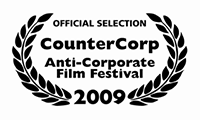2009 Anti-Corporate Film Festival

Apology of an Economic Hit Man — A film adaptation of John Perkins' book Confessions of an Economic Hitman, which caused an international uproar by seeming to confirm what critics of international economic institutions such as the World Bank and IMF (and the Western governments that control them) have long suspected: that economic aid is designed to mire poor countries in permanent debt and force them to acquiesce to the interests of multinational corporations.
Interspersing re-enactments of Perkins' nefarious career with footage of his public apology for helping the U.S. to undermine (and possibly assassinate) Ecuador's populist president, the film chronicles Washington's use of this aid strategy in Panama, Saudi Arabia, and elsewhere around the world — most recently in Iraq (Greece, 2008, 93 minutes)
Black Wave — For 20 years, marine biologist Riki Ott and other residents of Cordova, Alaska have waged the longest legal battle in U.S. history against the world’s most powerful oil company, ExxonMobil, in an effort to win compensation for the environmental, economic, and health effects of the worst industrial disaster in American history: the 1989 Exxon Valdez oil spill in Prince William Sound.
Directed by Robert Cornellier (Canada, 2008, 99 minutes)
Blue Gold: World Water Wars — As giant corporations seek to privatize our finite and dwindling water supply, a basic human necessity is being transformed into a for-profit commodity. The increasing competition for control over water has already led to violent domestic conflicts: i.e., the world's first "water wars".
(USA, 2008, 94 minutes). Director Sam Bozzo in attendance for a post-screening Q & A.
Directed by Steven Greenstreet (USA, 2008, 105 minutes)
RIP: A Remix Manifesto — An exploration of the notion of copyright in the Digital Information Age, as technology shatters the traditional wall between producers and consumers. The film's protagonist is a "mash-up" DJ known as Girl Talk who performs by chopping up and re-assembling other people's songs. The film itself is a mash-up: The director made his raw footage available for anyone to remix. This participatory media experiment sounds an urgent alarm to save our culture and right to creative expression from corporate control and commodification.
Directed by Brett Gaylor (USA, 2008, 86 minutes)
Sweet Crude — The opening night screening is the West Coast premiere of the first full-length film about Big Oil's devastation of the people and environment of the Niger Delta region of Nigeria, and efforts by local residents to have their grievances against the oil companies and addressed. The screening coincided with the start of a civil trial in New York against Shell Oil and one of its executives, for their roles in the torture and killing of Nigerians protesting oil operations.
(USA, 2009, 92 minutes). Director Sandy Cioffi and much of her crew in attendance for a discussion about their experiences making the film — including being detained by Nigerian security forces for seven days. Co-presented by Justice in Nigeria Now.



